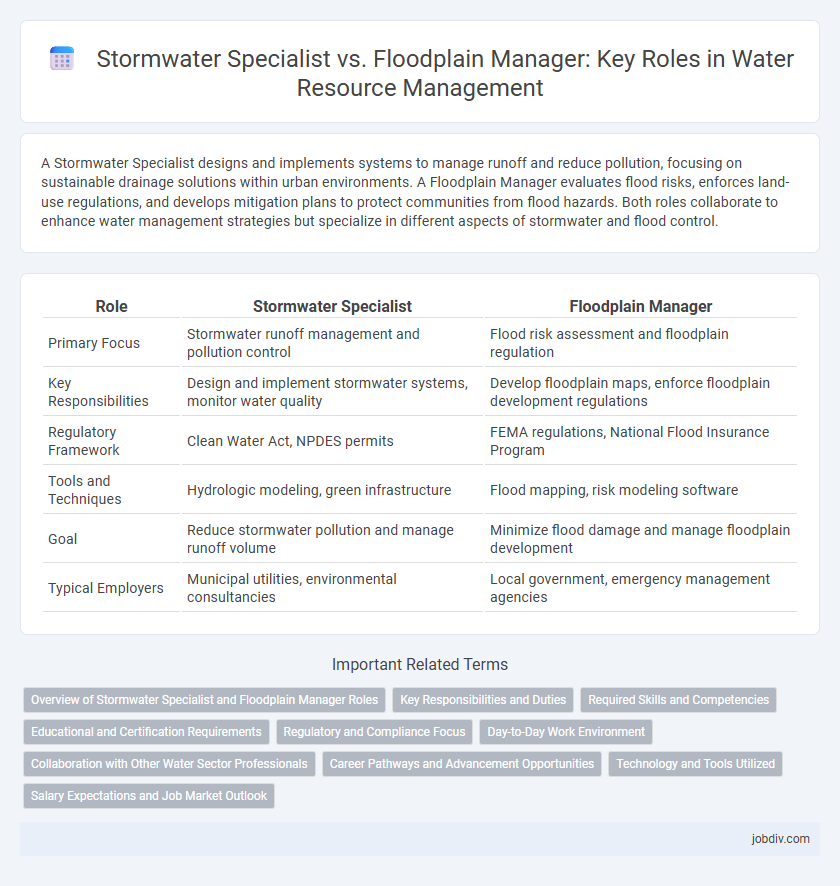A Stormwater Specialist designs and implements systems to manage runoff and reduce pollution, focusing on sustainable drainage solutions within urban environments. A Floodplain Manager evaluates flood risks, enforces land-use regulations, and develops mitigation plans to protect communities from flood hazards. Both roles collaborate to enhance water management strategies but specialize in different aspects of stormwater and flood control.
Table of Comparison
| Role | Stormwater Specialist | Floodplain Manager |
|---|---|---|
| Primary Focus | Stormwater runoff management and pollution control | Flood risk assessment and floodplain regulation |
| Key Responsibilities | Design and implement stormwater systems, monitor water quality | Develop floodplain maps, enforce floodplain development regulations |
| Regulatory Framework | Clean Water Act, NPDES permits | FEMA regulations, National Flood Insurance Program |
| Tools and Techniques | Hydrologic modeling, green infrastructure | Flood mapping, risk modeling software |
| Goal | Reduce stormwater pollution and manage runoff volume | Minimize flood damage and manage floodplain development |
| Typical Employers | Municipal utilities, environmental consultancies | Local government, emergency management agencies |
Overview of Stormwater Specialist and Floodplain Manager Roles
A Stormwater Specialist develops and implements strategies to manage runoff and reduce pollution in urban and natural environments, focusing on drainage systems, water quality, and regulatory compliance. A Floodplain Manager evaluates flood risks, enforces land-use regulations, and coordinates community preparedness to minimize flood damage and ensure public safety. Both roles collaborate to improve water management and resilience against weather-related challenges.
Key Responsibilities and Duties
Stormwater Specialists focus on designing, implementing, and maintaining systems that manage runoff to prevent urban flooding and pollution, emphasizing compliance with environmental regulations and green infrastructure solutions. Floodplain Managers are responsible for assessing flood risks, developing land-use policies, and coordinating disaster response efforts to minimize flood damage in designated floodplain areas. Both roles require expertise in hydrology, GIS mapping, and regulatory frameworks but differ in their scope, with Stormwater Specialists targeting urban drainage systems and Floodplain Managers focusing on broader flood risk management and mitigation.
Required Skills and Competencies
Stormwater Specialists require expertise in hydrology, urban drainage systems, and water quality management, alongside proficiency in GIS mapping and stormwater modeling software. Floodplain Managers must possess skills in flood risk assessment, regulatory compliance with the National Flood Insurance Program (NFIP), and community outreach for disaster preparedness. Both roles demand strong analytical abilities, project management capabilities, and knowledge of environmental regulations related to water resource management.
Educational and Certification Requirements
A Stormwater Specialist typically requires a degree in environmental science, civil engineering, or a related field, alongside certifications such as Certified Stormwater Manager (CSM) or Professional Engineer (PE) with stormwater focus. Floodplain Managers often hold certifications from the Association of State Floodplain Managers (ASFPM), including Certified Floodplain Manager (CFM), complemented by educational backgrounds in hydrology, geography, or environmental planning. Both roles demand continuous professional development to stay updated on regulatory compliance, flood risk assessment, and best management practices in water resource management.
Regulatory and Compliance Focus
Stormwater Specialists primarily concentrate on managing runoff quality and adherence to municipal and environmental regulations such as the Clean Water Act and local stormwater permits. Floodplain Managers focus on compliance with federal and state floodplain management regulations, including FEMA guidelines and the National Flood Insurance Program (NFIP). Both roles require ensuring community safety and environmental protection through regulatory enforcement and risk mitigation strategies.
Day-to-Day Work Environment
A Stormwater Specialist typically focuses on managing runoff through drainage systems, green infrastructure, and regulatory compliance in urban settings, often coordinating with engineers and environmental agencies. A Floodplain Manager's day-to-day work involves mapping flood zones, analyzing hydrologic data, and implementing mitigation strategies to reduce flood risks in both rural and urban landscapes. Both roles require collaboration with local governments and stakeholders to ensure water management practices align with environmental regulations and community safety goals.
Collaboration with Other Water Sector Professionals
Stormwater specialists and floodplain managers collaborate closely with hydrologists, civil engineers, and urban planners to design integrated water management systems that reduce runoff and mitigate flood risks. Their combined expertise ensures the development of resilient infrastructure, effective stormwater controls, and sustainable land use planning practices. Coordination with environmental scientists and local government agencies further enhances the protection of water quality and community safety.
Career Pathways and Advancement Opportunities
Stormwater Specialists focus on designing and implementing systems to manage runoff and prevent water pollution, often working with environmental engineering or urban planning backgrounds. Floodplain Managers specialize in assessing flood risks, developing mitigation strategies, and enforcing regulations to protect communities, frequently requiring expertise in hydrology, GIS, and emergency management. Career advancement for Stormwater Specialists often leads to roles in environmental consulting or municipal water resource management, while Floodplain Managers may progress to senior roles in federal agencies or disaster resilience planning departments.
Technology and Tools Utilized
Stormwater Specialists employ advanced Geographic Information Systems (GIS) and hydrologic modeling software like SWMM to design efficient drainage systems and manage urban runoff. Floodplain Managers utilize FEMA flood maps, hydraulic models such as HEC-RAS, and remote sensing technology to assess flood risks and develop floodplain zoning regulations. Both roles integrate real-time data from IoT sensors and drones for monitoring precipitation and water flow, enhancing decision-making in water resource management.
Salary Expectations and Job Market Outlook
Stormwater Specialists typically earn between $55,000 and $85,000 annually, reflecting demand in urban planning and environmental services, while Floodplain Managers command a higher salary range of $65,000 to $95,000 due to specialized expertise in flood risk assessment and mitigation. The job market outlook for Stormwater Specialists is expanding steadily with increasing infrastructure projects targeting sustainable water management, whereas Floodplain Managers experience robust growth driven by heightened floodplain regulation enforcement and climate change adaptation efforts. Both roles offer strong employment prospects, but Floodplain Managers generally benefit from broader federal and state funding opportunities.
Stormwater Specialist vs Floodplain Manager Infographic

 jobdiv.com
jobdiv.com